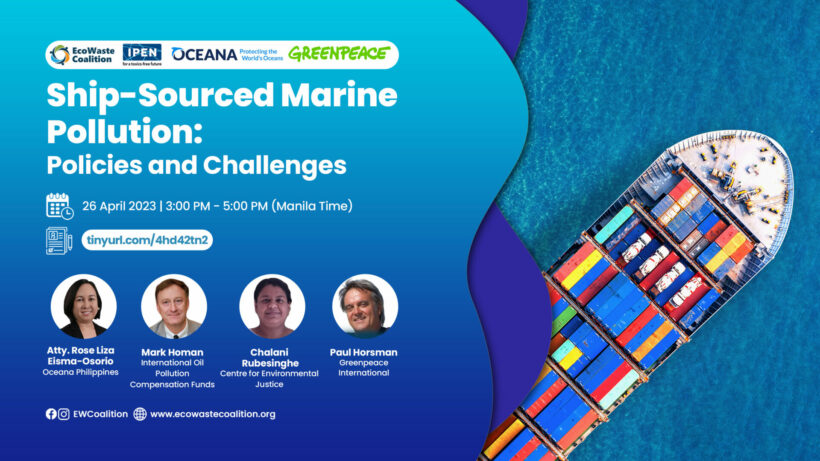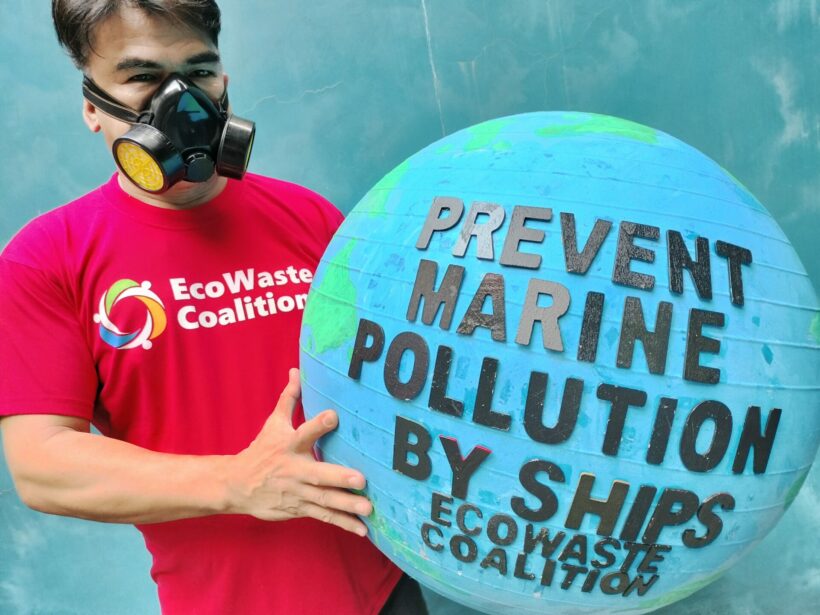27 April 2023, Quezon City. As the devastating impact of the oil spill from the sunken MT Princess Empress on coastal and fishing communities and the ecosystems continues to unfold, environmental and legal experts put forward important policy recommendations addressing ship-sourced marine pollution.
At a webinar delving into the theme “Ship-Sourced Marine Pollution: Policies and Challenges,” lawyers and activists identified policy measures, which, if pursued and implemented, can help in preventing pollution from shipping activities and in ensuring just compensation for those affected by the spillage of oil and other hazardous and noxious substances transported by ships.

Among the policy measures proposed was the government’s ratification of the Hazardous and Noxious Substances Convention, strengthening of the oil pollution compensation law, review of navigational lanes and adoption of strict guidelines for the movement of ships, designation of Particularly Sensitive Sea Area (PSSA), and the regulation of marine carriage of pre-production plastic pellets (also known as nurdles).
The EcoWaste Coalition, Greenpeace Philippines, International Pollutants Elimination Network – Southeast & East Asia, and the Oceana Philippines co-organized the said webinar held on April 26 via Zoom.
Atty. Rose Liza Eisma-Osorio, Legal and Policy Director of Oceana Philippines, pointed to legal issues and gaps that have to be fixed to strengthen the national capacity to proactively prevent and effectively deal with ship-sourced marine pollution. For instance, the liability for pollution and dumping under the Clean Water Act, Marine Pollution Decree and other environmental laws is mostly enforced for land-based sources, not ship-sourced pollution, she said. Also, she noted that the liability for oil spills under the Oil Pollution Compensation Fund is limited only to the shipowner and other parties are exempted from claims for compensation. Congress has yet to enact a law localizing the International Convention for the Prevention of Pollution from Ships (MARPOL), she reminded. Finally, Osorio observed that multiple agencies involved in marine pollution prevention are siloed and largely issue-based.
To address these legal issues and gaps, Osorio suggested amending the Oil Pollution Compensation Fund, particularly Section 8(c) which exempts any charterer from claims for compensation for pollution damage; enacting a legislative measure on reparations for pollution damage due to the Oriental Mindoro Oil Spill (similar to the measure taken in response to the Guimaras Oil Spill); reviewing the navigational lanes and enacting strict guidelines for the movement of ships, especially those near at nationally and locally protected Marine Protected Areas (MPAs); and availing of legal remedies to address compensation and accountability issues, such as but not limited to, the Writ of Kalikasan (nature).
UK-based lawyer Mark Homan, Claims Manager at the International Oil Pollution Compensation Funds (IOPC Funds) gave an overview of the global legal framework governing ship-sourced pollution such as oil tanker spills, particularly the applicable International Maritime Organization (IMO) liability and compensation conventions.
He noted that while the Philippines has ratified the International Convention on Oil Pollution Preparedness, Response and Cooperation, the International Convention on Civil Liability for Oil Pollution Damage, and the International Convention on the Establishment of an International Fund for Compensation for Oil Pollution Damage, it has yet to accede to or ratify six other maritime liability and compensation conventions, including the International Convention on Civil Liability for Bunker Oil Pollution Damage (entry into force: 2008), the Nairobi International Convention on the Removal of Wrecks (entry into force: 2015), and the 2010 Hazardous and Noxious Substances Convention (not yet in force). Homan encouraged accession to or ratification of these agreements.
Chalani Rubesinghe of the Centre for Environmental Justice (CEJ) recalled the impacts of Sri Lanka’s “worst toxic maritime disaster” and reportedly the world’s “worst plastic marine pollution event.” In 2021, X-Press Pearl caught fire off the coast of Colombo and subsequently sank spilling 9,700 metric tons of polymer resin, 1,680 metric tons of low and high-density plastic nurdles or pellets, 320 metric tons of bunker oil, 25 metric tons of caustic soda, methanol and nitric acid, and other hazardous materials, including 349 containers of epoxy resin, 39 containers of lubricating oil, gear oil and brake oil, 20 containers of bright yellow sulfur, 8 containers of lead ingots, 1 container of lithium-ion batteries, and many other items.
Among other recommendations, Rubesinghe, who co-authored the report “X-Press Pearl: A New Kind of Oil Spill, A Toxic Mix of Plastics and Invisible Chemicals” published by CEJ and IPEN, proposed that marine carriage of tiny plastic pellets or nurdles must be regulated.
“Burnt and unburnt plastic pellets estimated at up to 75 billion pieces have resulted in a serious plastic pollution crisis affecting miles of our country’s coastline and aquatic life, and also posing health threat to women engaged in the manual beach cleaning process,” she said. “It’s high time to regulate these microplastics, including imposing stringent safety requirements for their packaging, storage and transfer, and notification on their presence in marine transportation.”
Paul Horsman, a marine biologist from Greenpeace International, who has witnessed the devastating impacts of many oil spills, including the 1992 Gulf War oil spill, the 1994 oil spills in the Russian Arctic and the 2010 BP Deepwater Horizon oil spill in the Gulf of Mexico, spoke about designating certain areas as a PSSA.
A PSSA is an area that needs special protection through action by the IMO because of its significance for recognized ecological or socio-economy or scientific reasons, and which may be vulnerable to damage by international maritime activities.
“Clearly, if we are to protect areas, we need to make them off limits to those activities which threaten them. That is to get an area designated as a PSSA. This is not difficult and does not require a raft of new policies or regulations as there is a clear mechanism in place under the IMO to establish a PSSA. This would then lead to an area to be avoided by transiting ships,” he said. “It is also a step that would go some way to satisfying demands from civil society for greater protection of the coast and seas.”
“The process within the IMO can take months or even more than a year or two partly due to the time between meetings of its Marine Environmental Protection Committee. This being the case, the government could, as an interim measure, call for a voluntary area to be avoided at the IMO pending the establishment of a PSSA as a demonstration of its commitment,” he suggested.






